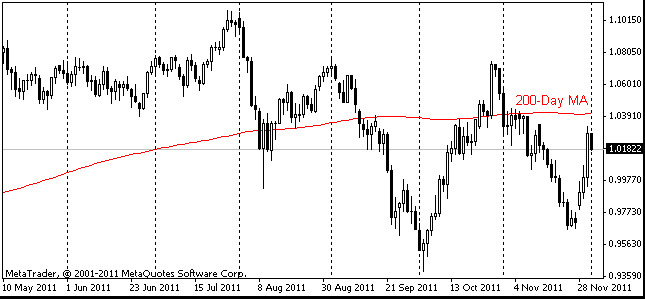EUR/usd
Yesterday afternoon the euro continued storming new peaks once the dollar had weakened after Fed's allusions to the further QE. At some point the single currency rose to 1.3180, but climbed down by the end of the day on the stock market correction. It is noteworthy that stocks of financial companies suffered a greater decline yesterday than any other groups. They are the first to be influenced by changing sentiments. Now the markets seem to be tired of the vigorous upward march, observed from mid-December. If the markets show a decline or stop growing, it may again bring market participants to the safe-haven assets, thus weakening the euro. Now markets have allowed Europe to take a time-out, which is clearly reflected in quite positive results of the auctions. There's nothing surprising in that and no one to thank for it – participants simply look forward to the positive outcome of talks over Greece and seek to buy bonds of the countries which offer high yields. The securities of the troubled countries (e.g. Italy, Spain and Portugal) allow for such income, especially against the background of the decreasing profitability of U.S. securities with almost equal inflation rates on either side of the Atlantic. Spain is carrying out a heroic struggle with the crisis and its labor unions agree with the government on the minimum wage increase of 0.5% for this year. At the same time troubled Ireland is successfully exchanging its securities for longer-term ones, which can mark the country's return to the debt markets. Speculators may retreat, but it won't change the general tendency – all the economies, experiencing the period of severe austerity, will face hard times, and under such circumstances even the current monetary policy looks tough and the exchange rate – too high. Most likely, the euro has been merely corrected and will acquire a declining tendency for this year.

GBP/USD
The pound is still rallying against the dollar, and Thursday became another day of growth. Now there are nine of them in a row. Over that time the pair has risen from 1.5230 to 1.5730, mainly on the external positive news. Market participants have ignored the talks of the monetary committee about further purchases under the QE; the fact that the economy has lost 0.2% in the fourth quarter (worse than expected) has been almost overlooked as well on the growth in the stock markets. Market players bet on the hope that Britain will feel better due to the progress in the United States. However, let's be careful: on the one hand, this very progress has already begun to limp and, on the other hand, austerity in Britain has caused the drop in the number of state employees there, which is certain to tell negatively on consumer spending. CBI Retail balance survey shows that the sales index fell to -22 in January. That is the minimum figure since March 2009. Let us remind that it was the very deep of the crisis.

USD/JPY
The Japanese currency seems to completely ignore its domestic affairs, but at the same time reacts very sensitively to the European news. Despite the reported progress in negotiations (IIF has yielded and offered the coupon level of 3.75%), the markets still anticipate a default in Greece. Following the decline in U.S. stock markets, the yen has slid down to 77.0, while on Wednesday afternoon it was yet trading at 78.30. Our supposition that the market would prefer to return to the traded range proved to be true. It seems that the forces are still well balanced, which doesn't give the pair a chance go in this or that direction. Well, the longer the consolidation holds, the stronger the break out of it is.

AUD/USD
Yesterday the aussie was only one step away from 1.07. During the trading the quotations reached the level of 1.0687. Again, the softness of Fed's policy may cause the rise in the prices of gold and other commodity assets, which will probably have a positive impact on the Aussie. However, the rally, that has been in place already for more than a month and has raised the pair from 0.9850 to 1.06, is likely to require a stop at any time. Like two months ago, we say that the Aussie is an extremely volatile instrument which arouses a great interest among speculators.
